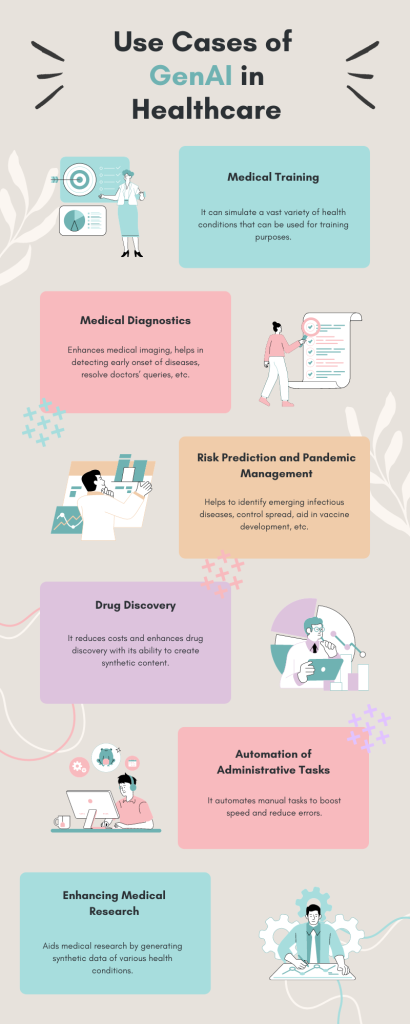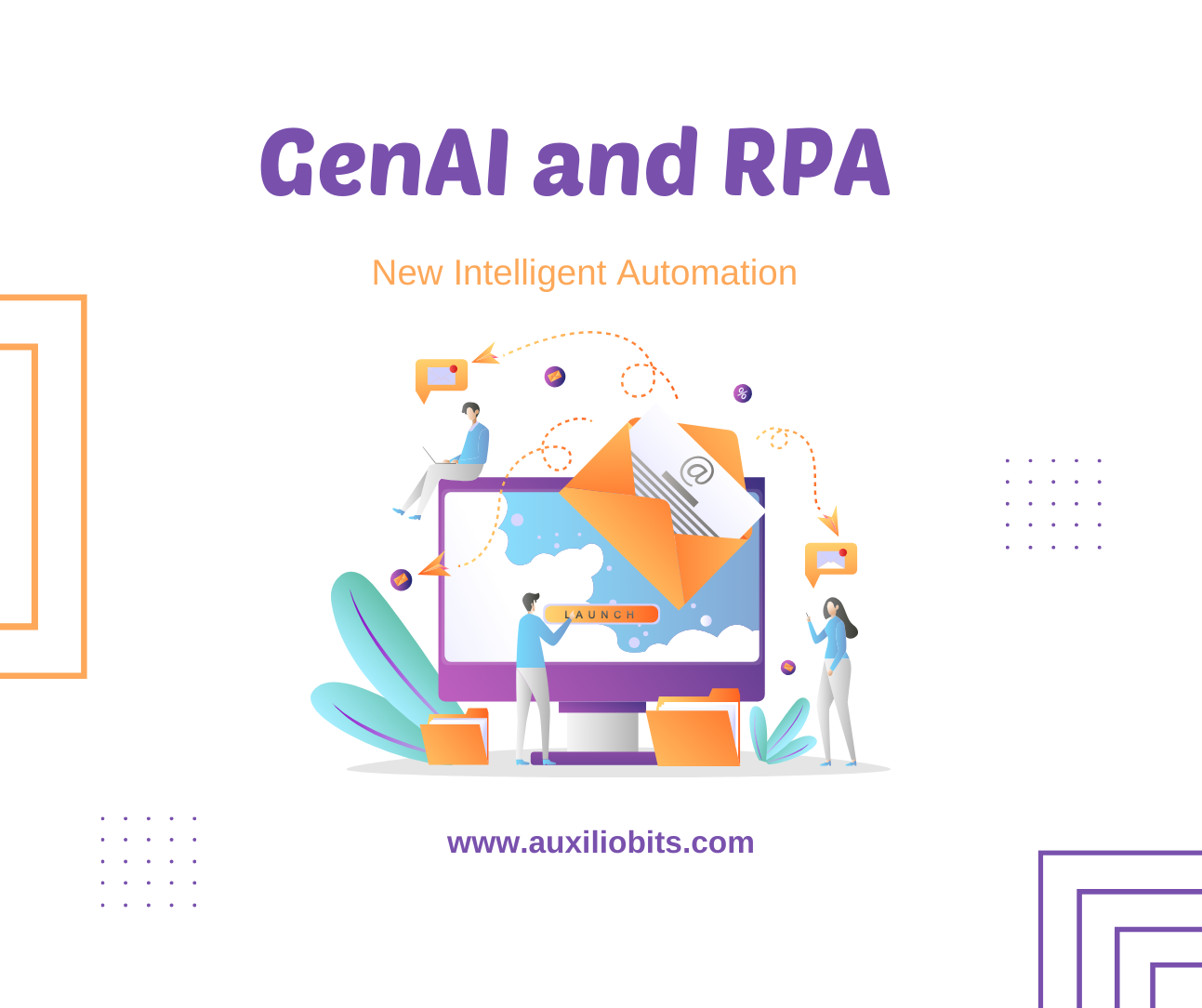Key takeaways
- Generative AI is a field of Artificial Intelligence that can create content in the form of text, video, audio, novel chemical structures, software codes, and more.
- GenAI models in healthcare can be used to create synthetic medical images, generate virtual patient data for training ML algorithms, design innovative molecules for drug discovery, simulation of disease progression, and more!
- Generative AI in healthcare finds applications in areas like medical training, diagnostics, pandemic management, automation of administrative tasks, drug discovery, medical research, and more.
- The deployment of GenAI in healthcare comes with its specific set of challenges that must be taken cognizance of.
- Generative AI holds a lot of promise for the healthcare sector which will unfold as the technology becomes more advanced.
Generative AI has taken the world by storm ever since it made its presence in 2022! Its transformative power has revolutionized several sectors including healthcare.
GenAI in healthcare holds huge potential! As per McKinsey, “GenAI can unlock some of unexplored $ 1 trillion improvement potential in healthcare. (Source: Master Of Code)
Before we dig deeper into how GenAI is transforming the healthcare sector, let us first look at what GenAI is all about!
Generative AI is a field of Artificial Intelligence that can create content in the form of text, video, audio, novel chemical structures, software codes, and more! This has opened the doors to unlimited possibilities for creativity and innovation. GenAI can generate outputs with an unprecedented level of realism and naturalness.
Generative AI in healthcare leverages ML (Machine Learning) algorithms for the analysis of unstructured data like patient health records, medical images, audio recordings of consultations, etc. GenAI models analyze vast volumes of medical data and generate new content.
This technology has gained a lot of traction in the healthcare ecosystem because of its capability to create reliable and innovative data. This aspect of generative AI has opened doors to a plethora of opportunities for healthcare. GenAI models can be used to create synthetic medical images, generate virtual patient data for training ML algorithms, design innovative molecules for drug discovery, simulation of disease progression, and more!
Generative AI in healthcare has the potential to make healthcare more accessible and affordable, improve the quality of care, minimize inequities in research and care delivery, etc.
According to an article in 2024 Life Sciences and Healthcare, 75% of the leading healthcare firms are either experimenting or planning to scale GenAI. (Source: Global Market Insights)
Generative AI has emerged as a beacon of hope in the healthcare industry that is still grappling with the aftermath of COVID-19 coupled with rising healthcare costs. According to an article by Forbes, the GenAI technology can facilitate savings of $ 200 billion in medical expenses for the US medical sector.
Let us now Delve into the Use Cases of GenAI in Healthcare!

Medical Training
GenAI can simulate and replicate a vast variety of health conditions realistically. This creates a risk-free controlled environment for medical students and professionals to practice. It can generate patient models with different diseases for students and medical professionals to study. It can simulate several medical procedures and surgeries.
Generative AI can synthesize images of organs, tissues, etc., for training students and medical professionals.
The highlight of GenAI simulated scenarios is that, unlike traditional training with pre-programmed scenarios, it generates patient cases that can adapt in real time to the decisions made by trainees. This fosters a more challenging and authentic learning experience.
Medical Diagnostics
Generative AI can enhance medical diagnostics through:
- GenAI can convert low-quality scans into high-resolution medical images. These images clearly depict all the details that might have been missed in the original scan. GenAI algorithms apply anomaly detection after examining the details of the image and providing the results to the radiologists.
- Generative AI models can be trained based on medical images, lab tests, and other data of the patient to diagnose and detect early onset of various health conditions. The diagnostic ability of GenAI is proving to be a game changer because it can detect early onset of diseases like skin cancer, Alzheimer’s, hidden fractures, and more. GenAI algorithms can also reveal biomarkers that can cause certain disorders and predict disease progression as well.
- GenAI models analyze vast volumes of data and can provide answers to doctors’ queries as and when they require them.
Risk Prediction and Pandemic Management
Identification of new diseases depends largely on timely access to relevant data. GenAI can process data from diverse sources to identify emerging infectious diseases at their nascent stages.
It can also predict the probable hotspots for the disease outbreak by analyzing factors like population density, environmental conditions, etc.
GenAI analyzes genetic data to predict potential vaccine candidates thereby accelerating drug discovery.
Drug Discovery
The field of drug development is cost-intensive. Data reveals that the average cost of new drug development ranges between $ 1 billion to $ 2 billion which includes failed drugs. (Source: Itrex Group)
GenAI has the potential to reduce the time spent on designing and screening new drugs by almost half.
The Pharma industry can deploy GenAI in areas like:
- Design and synthesis of novel molecules that have the required properties. Researchers can study these molecules in the lab environment as required.
- Predicting the properties of new drug candidates and proteins.
- Creating combination medicines that are effective by predicting possible interactions between different drugs.
- Facilitating patient stratification and development of targeted therapies by identifying biomarkers associated with specific diseases.
- GenAI drastically reduces drug development costs by creating virtual compounds that have high binding affinity to the target. They can be tested in computer simulations for detailed study.
- Analyzing the molecular structure of novel drugs to predict their side effects.
- Accelerating the early stages of drug discovery by analyzing biological datasets identifying potential drug targets and validating them.
Automation of Administrative Tasks
Healthcare services have a myriad of administrative tasks to contend with. These tasks not only take up a lot of time for healthcare staff but can also lead to burnout of medical professionals. Studies indicate that the burnout rate among physicians in the US is 62%. (Source: Itrex Group)
This number surely cannot be ignored. Generative AI can relieve medical professionals of these tedious tasks. GenAI automates manual tasks to boost speed and reduce errors. The GenAI intervention further cuts down on the administrative costs of the healthcare organization.
How GenAI streamlines administrative tasks?
- Bots extract relevant information from the medical records of patients and populate it on health registries.
- GenAI tools complete clinical documentation by transcribing and summarizing patient data and updating it on the relevant EHR fields.
- It conducts an in-depth analysis of patient data like their medical history, lab results, scans, etc. It creates structured medical reports based on this data.
- Generative AI supports doctors by providing treatment recommendations and timely responses to their queries.
- Automation tools also streamline appointment scheduling by matching the patient’s needs with the availability of the doctor. These tools also send automated reminders and follow-up emails to patients.
- Insurance claim verification can be automated with GenAI making the process efficient and precise with minimal delays and enhanced financial workflows.
- GenAI tools provide insights based on patients’ feedback on various procedures by compiling survey data from multiple sources. These insights are highly effective in enhancing patient care and delivery.
- Generative AI can automate regulatory compliance checks to ensure that administrative processes adhere to healthcare laws and regulations.
Enhancing Medical Research
Data about different health conditions lays the foundation of medical research. However, there is a dearth of data especially when it comes to information on rare diseases. Data is not only expensive to gather but is also governed by privacy laws. These aspects create roadblocks in medical research.
Generative AI fills these gaps by creating synthetic data samples that augment real-life health datasets. Another favorable factor about synthetic data is that it is not bound by any privacy regulations because it doesn’t belong to any specific individual. The use of synthetic data prevents data breaches and unauthorized access to sensitive patient data.
Synthetic data can be deployed for testing and validation to ensure that health tech functions appropriately before it is used in real-world healthcare scenarios.
GenAI can generate any kind of medical data like EHRs, scans, etc.
However, healthcare is a sector that requires a human touch alongside technology. Therefore the synergy between human expertise and tech capabilities holds the key to leveraging the true power of technology. Seamless collaboration between GenAI and humans can revolutionize medical practices, boost efficiency, and enhance patient care.
The deployment of GenAI is not a simple and straightforward process, it comes with its specific set of challenges.
Challenges of Generative AI in Healthcare
- Training Bias
The performance of GenAI depends on the training data. There is a likelihood of bias against under-represented groups in case the training data does not represent the targeted groups comprehensively. The training data is vulnerable to bias because the algorithms are trained on vast volumes of patient records data. It is very difficult to detect and eliminate bias.
- Data Privacy
The use of generative AI in healthcare raises concerns about the protection of sensitive data. This data runs a risk of misuse or unauthorized access.
- Accuracy Concerns
Improper use of GenAI algorithms can lead to harmful medical decisions. The decisions depend on the insights provided by LLMs (Large Language Models) that are known to hallucinate. Hence, there is a risk of these models producing syntactically probable outcomes that may be factually incorrect.
- Over-reliance
It is likely that medical practitioners become over-reliant on technology and lose their ability to make independent decisions.
- Accountability
There is a lack of accountability while using GenAI tools for healthcare. This is because there is no clarity about who is responsible for the final health outcome, the doctor, AI vendor, or AI developer?
Tips to Get Started with GenAI
- Build an enterprise-level GenAI strategy by exploring new tools and business models with generative AI.
- Leverage data management and analysis tools to access large and mixed datasets.
- Hire in-house experts who can implement and track GenAI opportunities.
- Train stakeholders in using the technology effectively.
- Partner with tech companies and consulting firms like Auxiliobits for expert guidance to harness the full potential of the technology.
- Establish interoperability of data, systems, etc., that are for foundational GenAI.
- Develop effective and safe solutions by working with regulatory agencies.
Future of GenAI in Healthcare
We can expect ML algorithms to become more sophisticated with enhancements that will make the platform more accurate.
It will become easier to integrate GenAI with other technologies like medical imaging with wearable devices which will make healthcare more comprehensive and personalized.
We might see a better collaboration between healthcare providers, researchers, and tech companies which will pave the way for rapid implementation of GenAI algorithms in healthcare settings.
Generative AI can provide a myriad of benefits only if it is used correctly. Users need to be aware of the right approach to deploying GenAI tools. Besides, they must be aware of the common pitfalls in leveraging it. Also, there is a multitude of GenAI tools available in the market each with their unique set of features. Choosing the right one and deploying it effectively can be a daunting task.
Therefore, it is beneficial to work with a technology partner who can help you to implement GenAI tools effectively.
Auxiliobits is a leading technology consultant that provides clients with cost-effective automation solutions customized to their needs. Our domain-specific experts work with tech teams to recommend the best solutions for your healthcare organization. We have a proven track record of successfully implementing automation solutions across sectors for clients worldwide.
Call Us Now for a Seamless Digital Transformation!




 July 19, 2024
July 19, 2024
